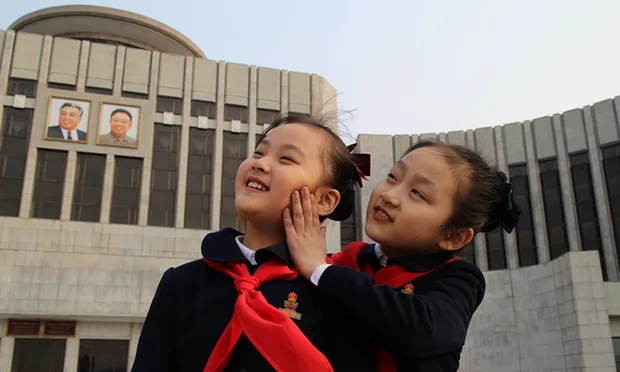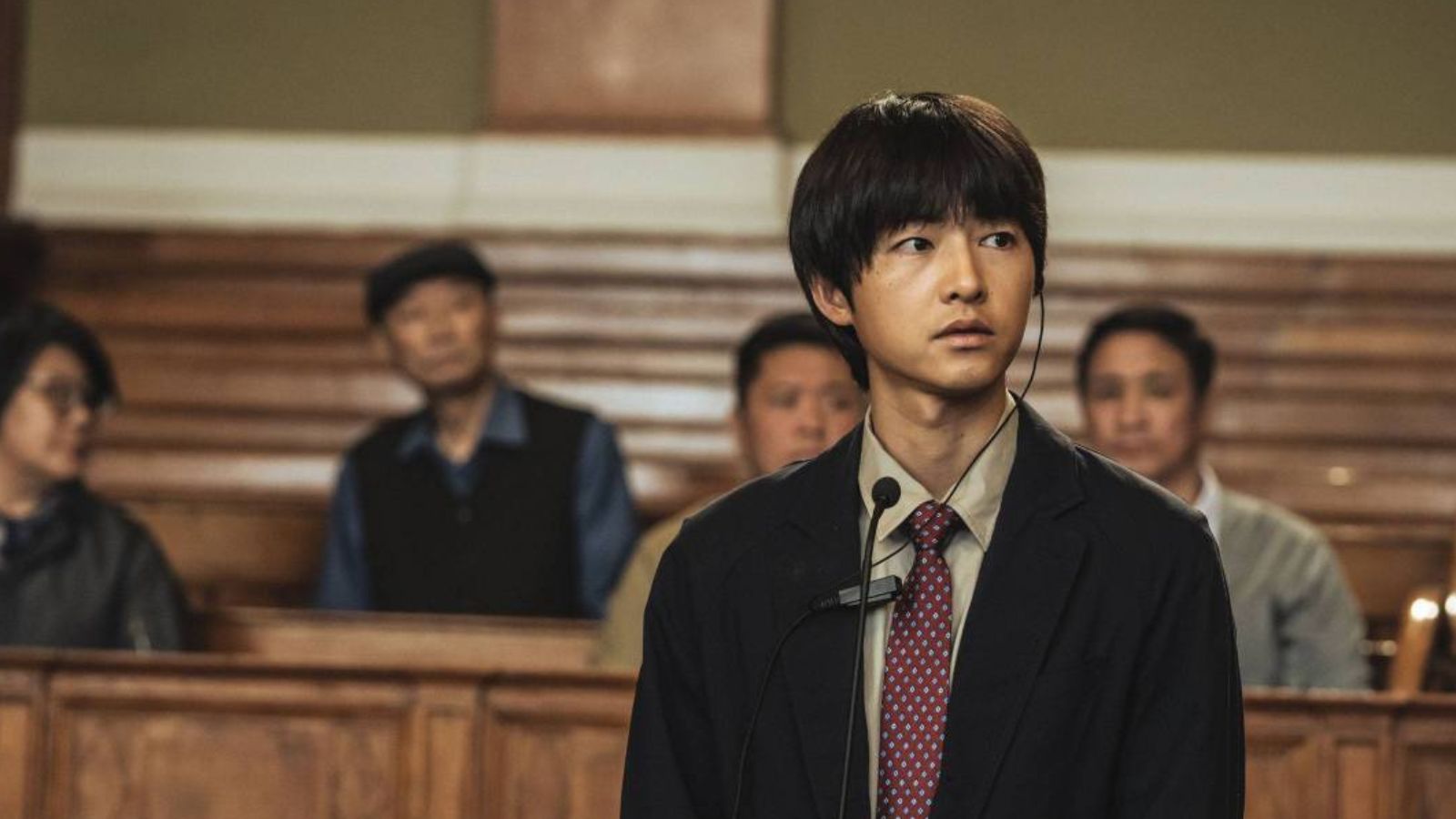Film Review: Under the Sun

Spoiler alert: The North Korean government suffers from a severe transparency deficit.
How do you reveal the reality of a society where government representatives script each scene you're allowed to shoot?
Simple: leave cameras rolling at all times, and show your audience the scripting and retakes of "real life" in all their glory.
You end up not with a documentary about a family going about their lives, but a behind-the-scenes reveal of a family whose dinner-table conversations, workplace interactions, and even expressed emotions are curated by government propagandists for external consumption.
No North Koreans question this process out loud--except to check their lines.In this system everyone knows the role expected of them, especially with government officials overseeing everything. So before our very eyes, we observe the theatrical production of an ideal 'Kimilsungist socialist society', played out by real citizen-actors. And when citizens know the risks of not playing the part they’re asked to play, they become good actors.
This is of course a very real aspect of life in North Korea, even when no cameras are rolling. The everyday ritualised theatrical production of 'obedient citizens willingly striving as one for the socialist cause' is one of the key means by which the state perpetuates itself. Everyone knows what to say, how to say it, and that you have to say it. Whatever your innermost thoughts may be, it's hard to break role publicly when everyone else is sticking so closely to a ‘script’.
Revealing the nature of this production, warts-and-all, is one of the key contributions of Under the Sun.But as with any behind-the-scenes look, cracks in the facade, tired actors and cock-ups are apparent.'Off stage', strategically placed cameras record poor Pyongyang kids scavenging from a trash can. We see commuters disembarking to push a tram. A government 'set manager' shoos away two women approaching the back door of a milk processing plant with a big jug; we can only guess they were looking for an off-the-books top up, unaware there were foreign filmmakers present that day.
We see a forgetful factory worker reporting they have exceeded production targets by 150%, and in the next take 200%. It doesn't matter to any of her coworkers which fiction is used, and no one bats an eyelid.
And of course, children being less practiced in their roles within the system than adults, the best scenes feature North Korean kids. A small girl struggles to keep her eyes open while an aging war veteran wearing far too many medals bumbles through an anti-American propaganda lecture, punctuating tales of shooting down planes with praise for Kim Il-sung.
Jinmi, the star of the film, breaks down in tears when the pressure of performance becomes too much. Elsewhere, on-screen text tells us that she unwittingly revealed her parents' true occupations of journalist and restaurant worker before the government co-producers scripted them as the more socialist-appropriate textile factory technician and soy milk plant worker.
It's hard to not recall The Truman Show, and it boggles the mind to think there are 25 million people living out their lives in this theater state.
But unlike a Hollywood Movie, the enemy here is not represented by a snarling on-screen character. The propagandists are unnamed and we rarely even see their faces properly. The enemy is in fact the system itself, whose quiet tyranny forces every citizen - including the propagandists - to become complicit in its perpetuation by allowing the expression of only a singular narrative of what it is to be a North Korean.
My Name Is Loh Kiwan | Fictional Story, Real Lives
From a crumpled piece of paper, he copies his name onto the Application for Recognition of Refugee status. The letters flow together in neat, sloping script to spell–Loh Kiwan.
This seemingly mundane declaration of identity serves as the focal point of Netflix’s recently released movie, My Name is Loh Kiwan. Showcasing the titular character’s past and present struggles as a North Korean defector seeking asylum in Belgium, the film follows Kiwan’s journey through both hope and heartbreak while he fights for a new life in freedom. He shows unimaginable resilience in the face of tragedy, betrayal, and bureaucratic apathy, carving out a place where he can live as himself, for himself.

Though based on a fictional novel, Loh Kiwan’s story captures the real life experiences of many North Korean refugees. Whether it be the harrowing circumstances of his escape, the subsequent challenges Kiwan faces while applying for asylum, or even the emotional turmoil of contending with his trauma, My Name is Loh Kiwan derives its drama from reality when depicting the struggles of North Korean defectors.
Uprooted by an act of defiance that saves his friend’s life, Kiwan and his mother escape across the border to China and live there under constant threat of arrest and forced repatriation. With no legal status as refugees and no legal options for leaving the country without government approval, North Korean defectors in China are exceptionally vulnerable to trafficking and exploitation. They live in the shadows, concealing their identities as best they can, despite cultural and language barriers. If captured and returned to their home country, they are subject to brutal torture, imprisonment, and execution. Rather than face such inhumanity, many see suicide as a final escape and carry poison or razor blades with them, much like Kiwan and his mother.
It is ultimately his mother’s sacrifice that saves Kiwan from such a fate. Her death forces him into a position nearly every North Korean refugee recognizes–having to leave behind friends, family, and loved ones with aborted goodbyes for the sake of everyone’s safety and survival. Kiwan’s only material connection to his mother is a photo and a wallet full of blood. In reality, most leave with even less than that.
Not wanting to incriminate the people close to them if they are caught trying to escape, most North Korean refugees forgo any identifying documents or proof of their existence. They take only the bare essentials for survival, not knowing that their arrival in a new country is only the beginning of their journey, or even if they'll make it.
But this is not the narrative Liberty in North Korea believes in. No North Korean person should have to endure the struggles or celebrate the successes of resettlement alone. Much like the assistance Kiwan later receives from an advocacy group that offers legal support and a community of other North Koreans, LiNK walks with our North Korean friends on their journey to freedom. And when they begin new lives, we support their success, amplify their voices, cultivate more leaders and changemakers working on this issue together.
In this, Kiwan’s story reflects yet another reality of the North Korean people. Not only do they encounter extraordinary hardships, but also, they face them with extraordinary strength. Throughout the film, Kiwan persists in his pursuit of an earnest, honest life. Despite setbacks and situations where he’s forced into hurt or hiding, he stays true to his mother’s wish for him to live well, and in doing so, inspires the people around him to do the same.

He finds hope, love, and freedom in others, but most importantly, in himself. When placed on trial to prove his identity before the court, Loh Kiwan proclaims the name his mother gave him.
Owning one’s identity as a North Korean person is not always easy. From the start of their escape, they are forced to hide. Once they reach freedom, the stigma and prejudice people hold towards their homeland pressures many to erase their accent or change their name–sometimes as a form of self-protection, other times as a way to fit in.
What Kiwan’s story shows, however, is that there is hope at the end of hiding. There is beauty in the simple, everyday life he longs for–a life where he can work for himself and share meals with friends, have a home, have a future, and have the choice to stay or go.

This is the life the North Korean people deserve, and every day, both within the country and without, they fight towards a better future. Their courage and indomitable spirit are not just figments of fiction. With your help, their freedom will become a reality.
Sign up below to learn how YOU can help support North Korean refugees today.




